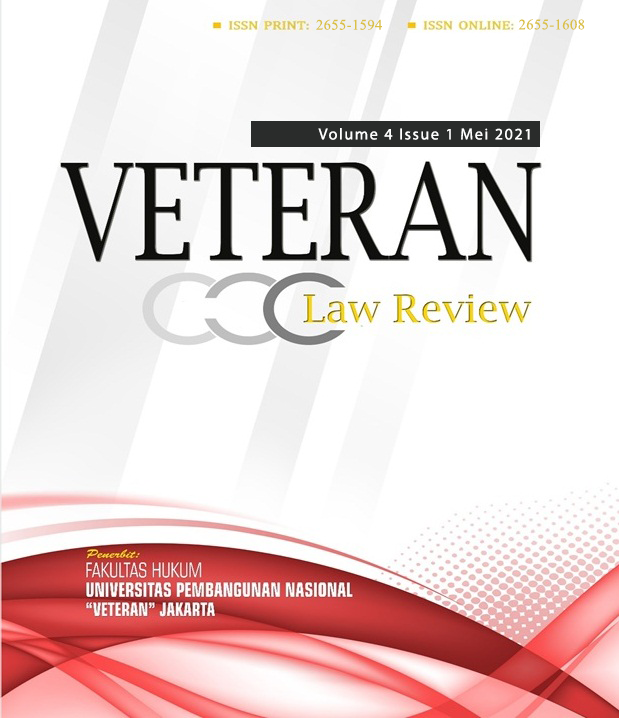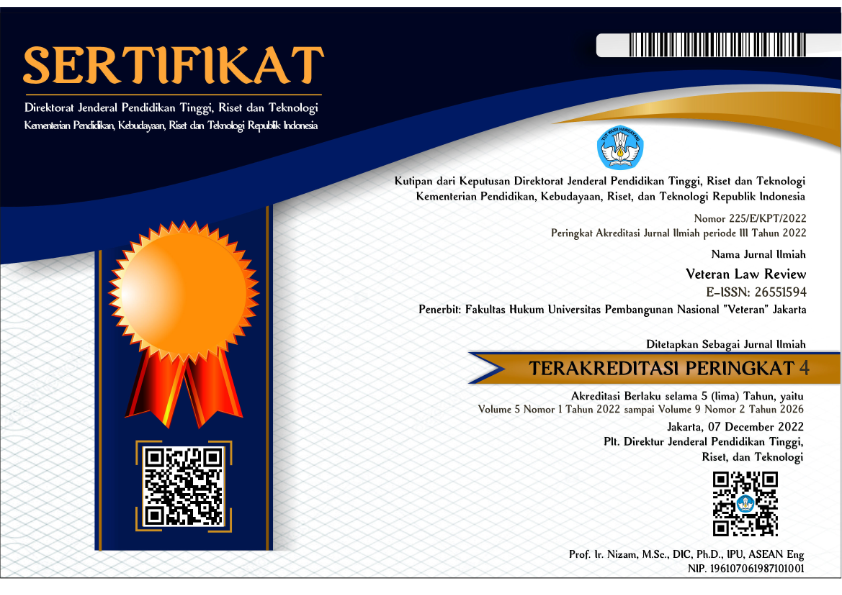The Authority of the Honorary Council of the Indonesian Notary Association in Imposing Sanctions for Violation of the Notary's Code of Ethics
DOI:
https://doi.org/10.35586/velrev.v4i1.2696Abstract
A code of ethics is a pattern of rules, procedures, signs, ethical guidelines when carrying out an activity / a job. The notary code of ethics is all moral principles that guide in carrying out the position of a notary, whether it applies to Notaries or other people who hold and carry out the position of notary public. The Indonesian Notary Association as the only forum for Notaries has a very important role in making rules and enforcing the professional code of ethics for Notaries, because one of the complementary tools in the Indonesian notary association is the presence of an Honorary Council. The Honorary Council upholds the code of ethics, dignity and dignity of the Notary, which is independent and free from partiality in carrying out its duties and authorities in the association. The objectives of this study are 1. What are the obligations and prohibitions against Notaries, 2. How is the Authority of the Honorary Council of the Indonesian Notary Association in Imposing Sanctions for Violation of the Notary's Code of Ethics in Indonesia. The methodology used in this research is normative juridical. The results of the discussion are: Notaries have obligations and prohibitions, both those regulated by law and those regulated by a code of ethics. If the notary violates the law, the notary has indirectly violated the code of ethics. However, notaries who violate the code of ethics do not necessarily violate the law. In addition, in upholding the code of ethics, the Central Honorary Council only has the authority to give warnings and proposals to the central management to make a temporary dismissal (schorsing) of association members who violate the code of ethicsDownloads
References
Books
Abintoro, Prakoso, (2015) Etika Profesi Hukum Telaah Historis. Filsofis dan Teoritis Kode Etik Notaris, Advokat, Polisi, Jaksa da Hakim, Surabaya, LaksBang Justita.
Agus Santoso, (2014), Hukum, Moral dan Keadilan “Sebuah Kajian Filsafat Hukum. Jakarta, Kencana.
GHS Lumban Tobing , (1983)., Peraturan Jabatan Notaris, Cet. III, Erlangga, Jakarta.
_________, (1999), Peraturan Jabatan Notaris (Notaris Reglement), Penerbit Erlangga, Jakarta.
H.R. Purwoto S. Gandasubrata, (1998) Renungan Hukum, Jakarta, IKAHI Cabang Mahkamah Agung RI.
J.C.S Simorangkir, (2013), Kamus Hukum, Jakarta, Aksara Baru.
Kamus Bahasa Indonesia, (2008), Pusat Bahasa Departemen Pendidikan Nasional. Jakarta,
Lili Rasjidi&Ira Thania Rasjidi, (2012), Pengantar Filsafat Hukum, Bandung, Mandar Madju.
Matome M. Ratiba, (2013), Convecaying Law For Paralegals and Law Students, bookboon.com.
Sahrawardi K Lubis, (2012), Etika Profesi Hukum, Jakarta, Cetakan keenam, Sinar Grafika.
Supriadi, (2006), Etika dan Tanggungjawab Profesi Hukum di Indonesia, Jakarta, Sinar Grafika
Dirkareshza, R. (2019). Kompetensi DPD RI Dalam Mengemban Amanah Undang–Undang Nomor 2 Tahun 2018 Tentang MPR, DPR, DPD dan DPRD Sebagai Lembaga Tinggi Negara. Jurnal Yuridis, 6(2), 1-32.
Law & Regulation
Kitab Undang-Undang Hukum Perdata (KUHPer).
Undang-Undang Nomor 2 Tahun 2014 tentang Perubahan Atas Undang-Undang Nomor 30 tahun 2004 tentang Jabatan Notaris.
Anggaran Dasar (I.N.I), Anggaran Dasar Notaris Kongres Luar Biasa Ikatan Notaris Indonesia, Banten. 2015.
Anggaran Rumah Tangga (I.N.I), Anggaran Rumah Tangga Kongres Luar Biasa Ikatan Notaris Indonesia, Banten. 2015.
Kode Etik Notaris Indonesia (I.N.I), Kode Etik Notaris Kongres Luar Biasa Ikatan Notaris Indonesia, Banten. 2015.
Downloads
Published
How to Cite
Issue
Section
License
Copyright (c) 2022 Veteran Law Review Journal
Veteran Law Review © 2022 by Faculty of Law Universitas Pembangunan Nasional "Veteran" Jakarta is licensed under Creative Commons Attribution 4.0 International

1. License
The non-commercial use of the article will be governed by the Creative Commons Attribution license as currently displayed on Creative Commons Attribution 4.0 International.
2. Author(s)' Warranties
The author warrants that the article is original, written by the stated author(s), has not been published before, contains no unlawful statements, does not infringe the rights of others, is subject to copyright that is vested exclusively in the author, and free of any third party rights, and that any necessary written permissions to quote from other sources have been obtained by the author(s).
3. User/Public Rights
VELREV's spirit is to disseminate articles published are as free as possible. Under the Creative Commons Attribution-ShareAlike 4.0 International License. VELREV permits users to copy, distribute, display, and perform the work for non-commercial purposes only. Users will also need to attribute authors and VELREV to distributing works in the journal and other media of publications.
4. Rights of Authors
Authors retain all their rights to the published works, such as (but not limited to) the following rights;
- Reproduce the work
- Prepare derivative works based upon the work
- Distribute copies of the work
- Perform the work publicly
- Display the work publicly
- Copyright and other proprietary rights relating to the article, such as patent rights,
- The right to self-archive the article,
- The right to enter into separate, additional contractual arrangements for the non-exclusive distribution of the article's published version (e.g., post it to an institutional repository or publish it in a book), with an acknowledgement of its initial publication in this journal (Veteran Law Review).
5. Co-Authorship
If the article was jointly prepared by more than one author, any author submitting the manuscript warrants that he/she has been authorized by all co-authors to be agreed on this copyright and license notice (agreement) on their behalf, and agrees to inform his/her co-authors of the terms of this policy. VELREV will not be held liable for anything that may arise due to the author's internal dispute. VELREV will only communicate with the corresponding author.
6. Royalties
Being an open accessed journal and disseminating articles for free under the Creative Commons license term mentioned, author(s) are aware that VELREV entitles the author(s) to no royalties or other fees.
7. Miscellaneous
VELREV will publish the article (or have it published) in the journal if the article’s editorial process is successfully completed. JOSI's editors may modify the article to a style of punctuation, spelling, capitalization, referencing, and usage that deems appropriate. The author acknowledges that the article may be published so that it will be publicly accessible and such access will be free of charge for the readers as mentioned in point 3.


















